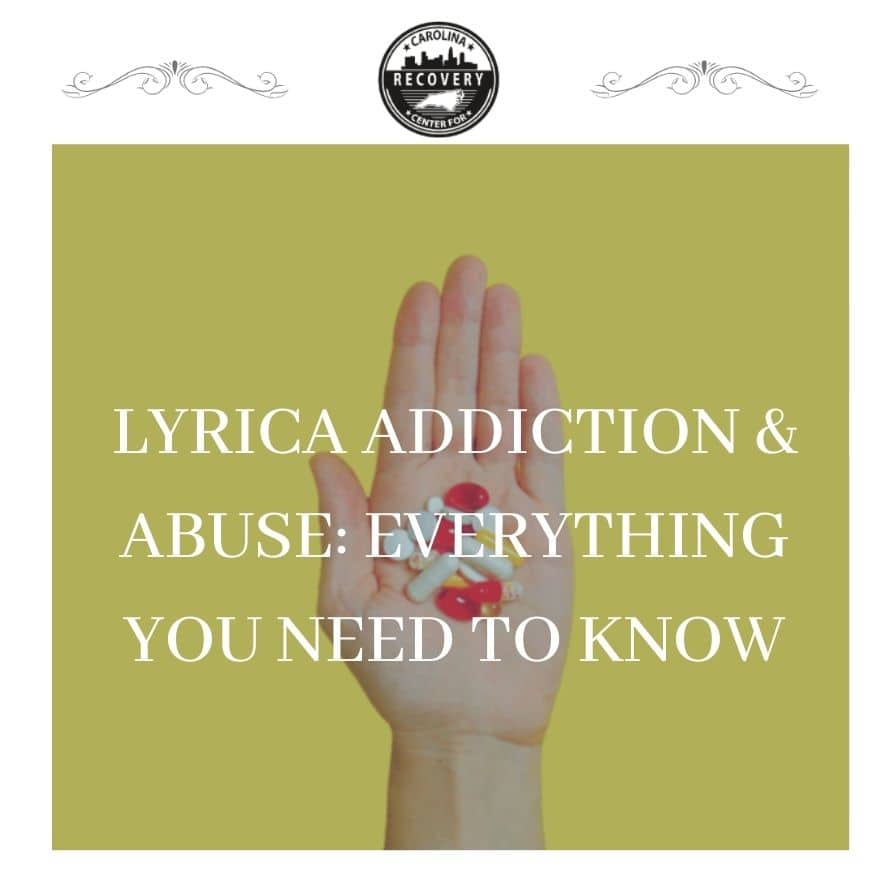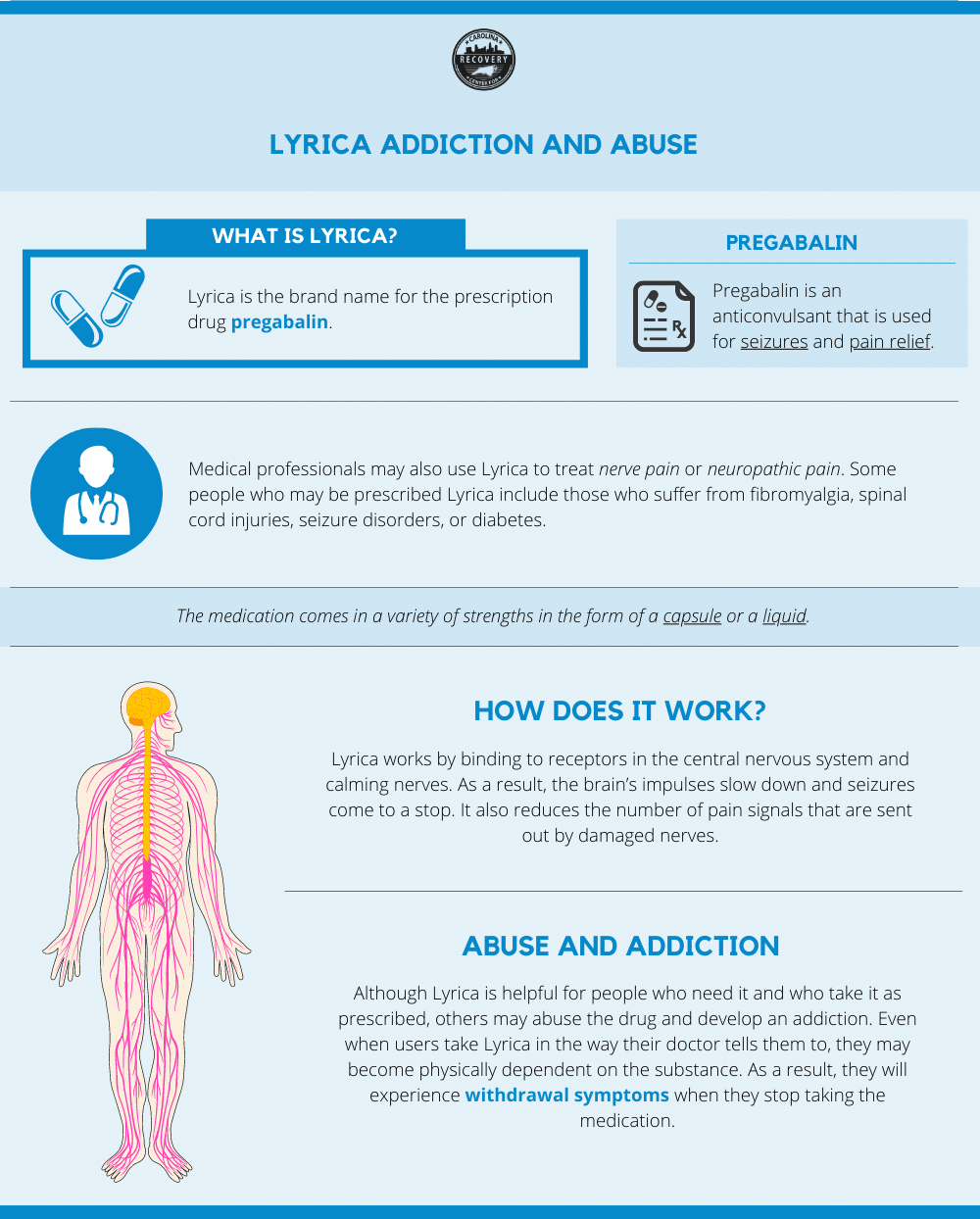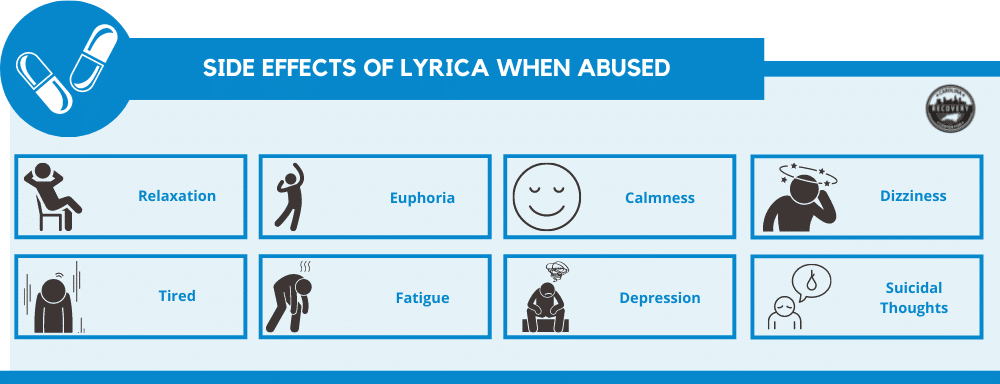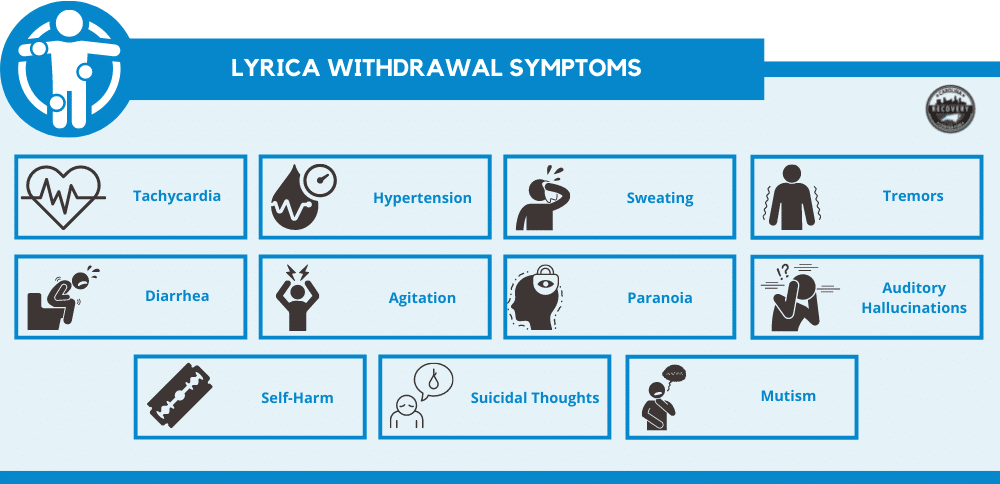Lyrica Addiction and Abuse: Everything You Need to Know

Medically Verified: 2/1/24
Medical Reviewer
Chief Editor

All of the information on this page has been reviewed and verified by a certified addiction professional.
Lyrica (pregabalin) is an FDA-approved anticonvulsant medication used to provide pain relief and treat seizure disorders such as epilepsy. However, some people abuse Lyrica by mixing the medication with more dangerous substances such as heroin. When abused, it doesn’t take long to develop a Lyrica addiction.
Although Lyrica is a relatively new prescription medication, it has quickly gained popularity as an alternative for opioid medications. Lyrica isn’t quite as addictive as opiates like heroin or oxycodone, but people who are at-risk for addiction may abuse and become addicted to this drug.
What is Lyrica (Pregabalin)?

Lyrica is the brand name for the prescription drug pregabalin. Pregabalin is an anticonvulsant that is used for seizures and pain relief. Medical professionals may also use Lyrica to treat nerve pain or neuropathic pain. Some people who may be prescribed Lyrica include those who suffer from fibromyalgia, spinal cord injuries, seizure disorders, or diabetes. The medication comes in a variety of strengths in the form of a capsule or a liquid.
Lyrica works by binding to receptors in the central nervous system and calming nerves. As a result, the brain’s impulses slow down and seizures come to a stop. It also reduces the number of pain signals that are sent out by damaged nerves. Although Lyrica is helpful for people who need it and who take it as prescribed, others may abuse the drug and develop an addiction.
Even when users take Lyrica in the way their doctor tells them to, they may become physically dependent on the substance. As a result, they will experience withdrawal symptoms when they stop taking the medication. As a result, people should always consult with their doctor before stopping Lyrica.
In the United States, Lyrica is currently a Schedule V controlled substance due to its slight potential for abuse. It is not a narcotic nor an opioid, but that doesn’t mean it isn’t habit-forming.
Side Effects of Lyrica Abuse and Addiction

Overall, Lyrica has a lower risk and rate of abuse and addiction than many other drugs in the United States. However, that doesn’t mean drug users don’t find ways to get high off of the drug. Lyrica is abused by drug users in many ways. Some will simply take a higher dose than they should while others will crush and snort the medication for a rapid and more intense high.
One common way that Lyrica is abused is by mixing it with alcohol or other drugs, such as opiates. When combined with other central nervous system depressants, the euphoric effects are exacerbated, but so is the risk of overdose.
When abused, Lyrica produces feelings of relaxation, euphoria, and calmness. They may also feel dizzy, tired, or fatigued. The high produced by Lyrica is comparable to that of alcohol or benzodiazepines, two additional substances that the medication should never be mixed with.
One terrifying risk to be aware of is the possibility that Lyrica can increase the risk of suicidal thoughts in people with depression. Many people who have taken Lyrica have reported sudden obtrusive, self-harming, or suicidal thoughts after starting the medication. Although only about 1 in 500 people who take Lyrica experience suicidal thoughts or actions, it is still something to be aware of. In people with existing mental health conditions or substance use disorders, this risk is particularly high.
Signs and Symptoms of Lyrica Addiction
People often compare the effects of Lyrica abuse to those of Valium, a benzodiazepine. Some people may abuse the drug to produce these effects, putting themselves at risk of addiction. Common signs and symptoms of Lyrica addiction include:
- Having withdrawal symptoms when stopping the use of Lyrica
- Experiencing drug cravings
- Going to several doctors in an attempt to get multiple prescriptions of Lyrica, known as doctor shopping
- Attempting to quit taking the medication but being unable to
- Continuing to take Lyrica despite a problem that is becoming worse due to drug abuse
- Purchasing Lyrica illegally on the streets
- Lying to friends, family, and co-workers about drug use
People who have a history of drug and alcohol abuse and/or addiction are more likely to abuse and become addicted to Lyrica.
Lyrica Withdrawal and Detox
Although expert knowledge on the discontinuation of Lyrica is limited, symptoms that may be associated with Lyrica withdrawal are:

- Tachycardia
- Hypertension
- Sweating
- Tremors
- Diarrhea
- Agitation
- Paranoia
- Auditory hallucinations
- Thoughts or actions involving self-harm
- Suicidal thoughts or attempts
- Mutism (a condition where people who are normally capable of speech cannot speak in a specific situation)
Since many of these withdrawal symptoms are extreme and life-threatening, the best way to stop taking Lyrica is to work with your doctor to set up a tapering schedule. Experts typically recommend that patients are tapered gradually over a period of one week, however, individuals with addictions may require a much slower, gradual taper.
In addition, individuals suffering from Lyrica addiction should never attempt detox alone. Medical detox programs can help provide support for withdrawal symptoms with 24/7 support, monitoring, and medication management. Furthermore, detoxing from Lyrica at a medical facility reduces the chances of self-harm, dangerous side effects, and relapse.
At the end of detox, clinical and medical staff can work with patients to make recommendations for ongoing treatment. In most cases, patients will be encouraged to attend inpatient or outpatient rehab.
Treatment for Lyrica Addiction
Substance abuse treatment programs ensure that patients address their co-occurring disorders, addictive behaviors, and root causes of their drug use. Patients may participate in group, individual, and family therapy sessions that address thought patterns, behaviors, and coping skills. Treatment programs for Lyrica addiction may include the following:
- Family support programs
- Group counseling
- Educational lectures about addiction
- Relapse prevention planning
- 12-step facilitation
- Life skills development
- Behavioral therapies like CBT, DBT, MI, and more
- Holistic therapies such as yoga, meditation, art, or music
- Exercise and nutrition programs
After completing treatment, some patients may choose to go to sober living homes, participate in recovery support groups, or some kind of aftercare. This helps ensure long-term sobriety.
Find Help for Lyrica Addiction Today
If you or a loved one have been abusing Lyrica, it is time to stop before it turns into a full-blown addiction. If you find that you’re unable to stop taking Lyrica, however, you might have already crossed that line and need professional addiction treatment. To avoid the dangerous side effects of withdrawals and the risks of detoxing alone, contact a dedicated treatment provider today to get started on your recovery.

